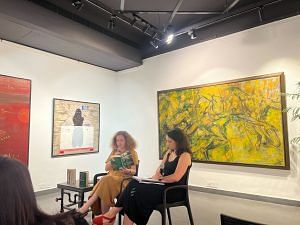Every evening, great-grandma locked the front door according to her own elaborate ritual, as if she believed she could protect us from uninvited guests, like the ones who had called her at her home in 1937, taking her husband away with them forever…. That evening they rang the doorbell. He said it was a mistake and he’d be right back, kissed me goodbye, and left with the strangers. I never saw him again’ — reads the first paragraph in the chapter titled ‘Doors’ in Ukrainian-Polish writer Zanna Sloniowska’s The House with the Stained–Glass Window. Sloniowska, born in Lviv, which was formerly in Poland and is now in western Ukraine, talks about generational trauma related to war, displacement and loss and how survivors cope with it. When Ukrainians read the novel, they told Sloniowska, “This is my grandmother. This is my experience.” It brought to painful consciousness the trauma of Russian occupation since 2014, and, for older readers with an ear for folklore, a century-old history of repression in the region since the time of the Austria-Hungarian Empire.
Ukrainians, quite literally, have choked on the arms of multiple regimes throughout their war-torn history. That points toward a question that the world literati have always asked yet never answered: How does one write during the war?
It didn’t matter to Ukrainians that the novel was originally written in Polish, Sloniowska’s native language. They devoured it as their own, as a ‘Ukrainian novel’, which, for the author, was a “fundamental experience.” For a region that has, for decades, experienced violence, Sloniowska gave them the language to express it. The House with the Stained–Glass Window has, at its heart, four generations of women surviving the war, its memories, and reconciliation with the past in a city whose every corner tells a story.

Also read: West must decide the end goal of war. Ukraine is being destroyed
Trauma gave way to creative liberty
Prior to March 2022, when Russia invaded Ukraine and declared war, the latter’s political and cultural history lay under a winter frost for the rest of the world. As a result, few saw the cracks between Poland, Ukraine, and Russia that went deep into their individual histories, and split identities and cultures —especially India, whose distance from Ukraine became metonymic for its knowledge gap. Until now, when, walking the tightrope between maintaining the status quo with the US and not upsetting Russia, India is finally stretching its neck to see what’s actually happening in the North.
Like most war-torn nations, Ukraine’s history is jarred, fragmented, and has levied a heavy price on its people’s lives and psyche. Zanna Sloniowska feels that “the country and its culture has always been at a crossroads”, which makes one dig even deeper for home. Personal trauma, she told me in a conversation, was the starting point for writing The House with the Stained-Glass Window because, for her, “art was a way to save ourselves. It gave me freedom”.
Sloniowska had bound her lifetime trauma within the spine of the book with exile, personal loss and melancholy saturating its pages — until it came out in English for the world to read. “I was crying when I saw it in English. For me, it was a provincial text, an intimate memory I wasn’t ready to share with the world,” she said. English was “too official” a language, Polish her own, and Ukrainian, a close sibling.
For Słoniowska, Ukrainian culture had its own charms — away from State scrutiny, oral narration was common practice, humming to songs a regular feature of one’s day. It retained the breadcrumbs of history and healed some wounds inflicted by the Austria-Hungary Empire, the Nazis, the Soviets, and the Russians. When she had left Lviv in 2002, she instinctively felt that “something was wrong” — the Polish didn’t hum too often, the air light without the fog of trauma.
Also read: ‘Where will authors go?’: Amazon’s shutdown of Westland leaves many questions, no answers
Writing amid conflict
Today, if you ask Zanna Sloniowska the same question, ‘How does one write during war?’, she has a different answer — you sew nets in libraries for the army that’s battling at the frontline. That’s the picture she draws for what’s happening in Ukraine right now, where writers, readers, and authors have come to the streets as volunteers to barbwire a country they desperately clutch onto as home. The same dilemma wretches one apart during war — do you make elite art, or do you come to the street to fight? A character in The House with the Stained-Glass Window chooses the latter.
Or, if you are a neighbouring country like Poland, you sideline the war that happened a century ago and “open your hearts and homes” to welcome those seeking escape, Sloniowska told ThePrint.
While India scribbles down Ukraine’s history on fresh pages, Ukrainians have a question for them — what do they have to say about the war? Except for presenting an apologist stand on India’s non-alignment, Sloniowska mostly met sideways glances.
(Edited by Zoya Bhatti)



